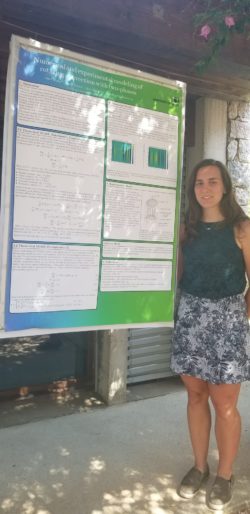LIFD Early Career Research Spotlight July: Janet Peifer

A photo of Janet with her first PhD poster presentation in Corsica(France) at the Waves Instabilities and Turbulence in Geophysical and Astrophysical Flows summer school in 2019.
Our monthly spotlight on the work and lives of the researchers from the Leeds Institute for Fluid Dynamics
This month: Janet Peifer
Thesis title: Numerical and experimental modelling of strongly rotating convection and phase changes.
School/ Faculty: Department of Applied Mathematics, School of Mathematics and Leeds Institute for Fluid Dynamics, University of Leeds
Supervisors: Steven Tobias and Onno Bokhove
Tell us a bit about yourself:
I grew up on a farm in Pennsylvania, USA, throwing hay bales and picking strawberries. I got my Bachelor’s Degree in Engineering Physics from Juniata College (Huntingdon, PA, USA) while enjoying playing rugby, leading the Women in Physics society, and working in the Technology Solutions Center. In my final year, I took a semester abroad at the University of Leeds, and had such a good time that I decided to stay! I found my current PhD project and supervisors during my time abroad. Since then, I’ve enjoyed the easy transportation by travelling often, when allowed of course, and the beautiful countryside of Yorkshire (I did the Yorkshire 3 Peaks last month).
What is your research about?
My project was meant to focus on the effects that rapid rotation have on a simplified precipitation model by investigating both numerical and experimental models. However, due to Covid, it wasn’t possible to build my experiment, and I’ve turned my focus entirely to numerics. I am now studying the effects different thermal boundary conditions have on rotating convection in numerical simulations, how to analyze each condition, and how the differences influence our interpretation of the relationships between numerical, experimental, and large scale flows. For instance, is it acceptable for us to assume experiments have fixed temperature boundary condition, rather than fixed flux? Or is it more appropriate to use the Robin condition to moderate the temperature condition between Dirichlet and Neumann?
What did you wish you knew before starting a PhD?
A few things! The most important would have to be knowing how to ask for help with both work and personal life. The start of a PhD can be tough- adjusting to a new place and schedule as well as being overwhelmed with new topics and literature to review! Your supervisors are there to help, and everyone in your research group is there to support you as well- no one is judging you (they’ve all been there). The university also has lots of support that is not just for undergraduates!
What are your plans for the future?
First and foremost- finish my PhD! With less than a year left, my focus is on writing up my thesis. After that, hopefully a nice holiday. Long term, I hope to move into industry or government work with a focus on sustainability. My latest dream is to work at the National Renewable Energy Laboratory!
Do you know the best ways to get involved with LIFD/ UoL?
I’m going to plug my own forum here- definitely join the Early Career Researchers Forum! We have monthly seminars and socials, occasional competitions and generally exist to help ECRs engage with peers across diverse fluids research fields. (Link to join here: link) More generally, don’t be afraid to join the societies and go to seminars! I spent a few years playing with the LUU Women’s Rugby Union society and it was great- they welcome all students, not just undergrads.
More information on Janet's profile can be found here: https://eps.leeds.ac.uk/maths/pgr/5666/janet-peifer
